3一个简单的方式改掉坏习惯
小方法轻松改掉孩子磨蹭拖拉的坏习惯

小方法轻松改掉孩子磨蹭拖拉的坏习惯文档编制序号:[KK8UY-LL9IO69-TTO6M3-MTOL89-FTT688]5个小方法,轻松改掉孩子磨蹭拖拉的坏习惯第一招:一分钟专项训练。
(1)训练孩子专心做题。
准备几十个简单的加减法口算题(根据年级不同,难度可以不同)。
规定一分钟,看孩子最多能做多少道题。
让孩子感觉到一分钟都能做十多个小题,而自己写作业的时候,有时候几分钟也写不出一个小题。
(计算不仅练速度,还锻炼专注力)(2)一分钟写汉字训练,找一些笔画和书写难度相当的生字,看孩子在一分钟内最多能写书多少个字。
记下每次的情况,并进行对比。
(3)一分钟写数字以上训练让孩子体会到时间的宝贵,原来一分钟可以做很多事情,珍惜时间。
同时也提高孩子的写字速度和做题的速度。
训练时以1分钟为一组,每天练习三至五组。
在训练的时候注意记录孩子的成绩,并进行对比,练习时间以一星期为宜。
可以通过奖励积分机制引导孩子参与,因为孩子可能第一次有兴趣,第二次好玩,第三次就不新鲜了。
设定挑战小目标不断激励尝试。
第二招:停止催促,坚持表扬。
孩子做事情磨蹭的时候,很多家长喜欢喊,不断的催促,结果感觉是越催促,孩子的动作越来,家长就更生气,孩子做某件事情的速度快,就表扬。
如刚开始可以给孩子出几道简单的题,给1分或2分钟,孩子会很快做好,家长要作大吃一惊状呼道:“还不到一分钟呢!”总之,很夸张的样子。
随时观察孩子在生活中的表现,对做得快的事情立即表扬。
“现在穿衣服快多了!”“现在收拾书包快多了。
”……这样的话。
但千万不要说成“现在穿衣服快多了!如果写作业也这样快就好了”。
只表扬,不提孩子做得不足的地方。
通过表扬,会激发孩子内在快的动力。
我还是认为表扬与批评相结合,孩子毕竟小,一畏的表扬会迷失方向,也不利于心理承受力的成长。
哪件事做得好就表扬,做的拖沓的也要及时指出来。
但避免孩子受到表扬高兴的时候泼冷水提以往的拖沓行为。
要是批评那就在错误正当时,孩子体会到拖沓不好的时候趁热打铁。
五个坏习惯的改正方法:马虎、注意力、学习疲劳、不会听课、怯场
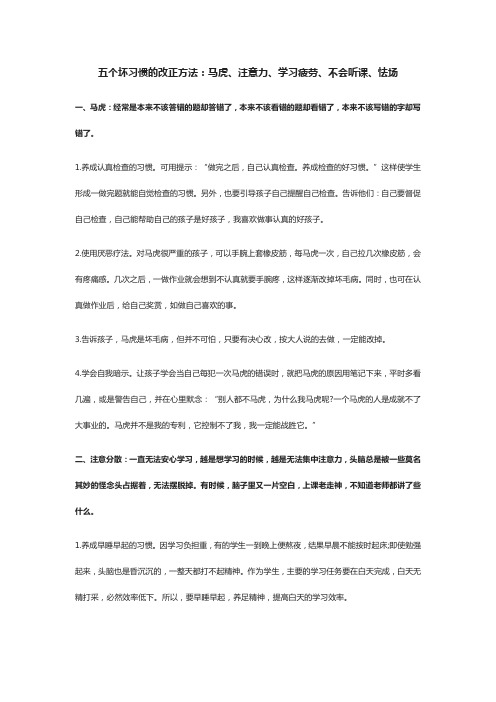
五个坏习惯的改正方法:马虎、注意力、学习疲劳、不会听课、怯场一、马虎:经常是本来不该答错的题却答错了,本来不该看错的题却看错了,本来不该写错的字却写错了。
1.养成认真检查的习惯。
可用提示:“做完之后,自己认真检查。
养成检查的好习惯。
”这样使学生形成一做完题就能自觉检查的习惯。
另外,也要引导孩子自己提醒自己检查。
告诉他们:自己要督促自己检查,自己能帮助自己的孩子是好孩子,我喜欢做事认真的好孩子。
2.使用厌恶疗法。
对马虎很严重的孩子,可以手腕上套橡皮筋,每马虎一次,自己拉几次橡皮筋,会有疼痛感。
几次之后,一做作业就会想到不认真就要手腕疼,这样逐渐改掉坏毛病。
同时,也可在认真做作业后,给自己奖赏,如做自己喜欢的事。
3.告诉孩子,马虎是坏毛病,但并不可怕,只要有决心改,按大人说的去做,一定能改掉。
4.学会自我暗示。
让孩子学会当自己每犯一次马虎的错误时,就把马虎的原因用笔记下来,平时多看几遍,或是警告自己,并在心里默念:“别人都不马虎,为什么我马虎呢?一个马虎的人是成就不了大事业的。
马虎并不是我的专利,它控制不了我,我一定能战胜它。
”二、注意分散:一直无法安心学习,越是想学习的时候,越是无法集中注意力,头脑总是被一些莫名其妙的怪念头占据着,无法摆脱掉。
有时候,脑子里又一片空白,上课老走神,不知道老师都讲了些什么。
1.养成早睡早起的习惯。
因学习负担重,有的学生一到晚上便熬夜,结果早晨不能按时起床;即使勉强起来,头脑也是昏沉沉的,一整天都打不起精神。
作为学生,主要的学习任务要在白天完成,白天无精打采,必然效率低下。
所以,要早睡早起,养足精神,提高白天的学习效率。
2.学会自我减压。
学生的学习负担已经很重,教师、家长的期望又给学生心理加上一道砝码,如果学生再对自己的考试成绩看得很重,无疑是自己给自己加压,必然不堪重负,变得疲惫、紧张和焦虑,心理上难得片刻安宁。
因此,要学会自我减压,别把考试成绩看得太重。
3.做些放松训练。
坏习惯整改措施

坏习惯整改措施坏习惯是每个人都会有的,不同的人都有不同的坏习惯。
有的人可能有熬夜、拖延、咬指甲等不良习惯。
习惯的培养需要时间和耐心,但只要下定决心,我们就能够改掉自己的坏习惯。
首先,了解坏习惯的危害是改掉它的第一步。
比如,熬夜可能会导致身体疲劳、注意力不集中等问题;拖延可能会导致任务积压、效率低下等问题;咬指甲可能会导致手指感染、牙齿变形等问题。
通过了解这些危害,我们会更加意识到坏习惯给自己带来的负面影响,从而产生改变的动力。
其次,制定明确的整改计划是改掉坏习惯的关键。
我们可以先列出要改掉的坏习惯,然后逐个制定措施。
比如,如果想改掉熬夜的习惯,可以设定一个固定的睡眠时间,避免在晚上过度使用手机或电脑;如果想改掉拖延的习惯,可以制定一个详细的工作计划,设置合理的时间安排和目标;如果想改掉咬指甲的习惯,可以戴上指甲油,通过美观的指甲来提醒自己不要咬。
然后,培养良好的替代行为是改掉坏习惯的有效方式。
每个人都有不同的方式来应对诱惑和压力,我们可以根据自己的情况选择合适的替代行为。
比如,如果想改掉熬夜的习惯,可以尝试看书或听音乐来放松身心;如果想改掉拖延的习惯,可以设定奖励制度来激励自己完成任务;如果想改掉咬指甲的习惯,可以找到其他适合咀嚼的物品,如口香糖或蔬果块。
此外,适当寻求他人的帮助和支持也是改掉坏习惯的重要因素。
如果自己无法坚持下去,可以告诉身边的人自己的整改计划,并请他们对自己进行监督和提醒。
亲友的支持和鼓励可以帮助我们更好地改掉坏习惯。
最后,持之以恒地坚持下去才能真正改掉坏习惯。
习惯的养成需要时间和毅力,不能期望一蹴而就。
只有坚持不懈地执行整改措施,我们才能逐渐培养出良好的习惯,并摆脱坏习惯的困扰。
总之,改掉坏习惯需要明确危害、制定计划、培养替代行为、寻求他人支持和坚持不懈等一系列措施。
只要我们下定决心,并付诸行动,相信我们一定能够成功改掉自己的坏习惯,走上更加健康和积极向上的道路。
如何改掉坏习惯和养成良好的习惯

如何改掉坏习惯和养成良好的习惯习惯是每个人日常行为中的重要组成部分,它对我们的生活和工作产生着深远的影响。
良好习惯使我们更高效、更积极,而坏习惯则可能阻碍我们的发展和成长。
因此,改掉坏习惯和养成良好习惯对个人的成长至关重要。
本文将探讨几种有效的方法,帮助我们改掉坏习惯并培养良好的习惯。
一、认识习惯的力量习惯是一种自动化的行为模式,它通过不断重复来形成。
一旦习惯形成,我们会在不经意间按照这种模式行动,而无需费神思考。
好的习惯能够提高我们的效率和生活质量,而坏习惯则会阻碍我们的发展和幸福感。
因此,我们需要认识习惯的力量,意识到它对我们的生活产生的巨大影响。
二、自我反思要改掉坏习惯和养成良好习惯,首先需要做的是自我反思。
我们需要仔细观察自己的日常行为,并辨别出哪些是坏习惯。
可以在一个笔记本上记录下这些坏习惯,并分析它们为什么会影响到我们的生活。
同时,我们也可以思考自己希望养成的良好习惯,并制定相应的计划。
三、设定明确的目标设定明确的目标是改掉坏习惯和养成良好习惯的第一步。
当我们明白自己想要达到什么目标时,就能更加有动力去改变自己的行为方式。
例如,如果我们希望养成每天早起锻炼的良好习惯,我们可以设定一个明确的目标:每天早上6点起床,并进行半小时的锻炼。
当我们有具体的目标时,就能更加坚定地朝着它前进。
四、分解任务,逐步改变改掉坏习惯和养成良好习惯需要一个渐进的过程。
将大目标分解为小目标,逐步改变是一种非常有效的方法。
例如,我们可以先尝试每周锻炼两次,然后逐渐增加到三次、四次,最终达到每天锻炼的目标。
通过逐步改变,我们可以慢慢适应新的行为方式,从而更容易坚持下去。
五、制定计划和时间表改掉坏习惯和养成良好习惯需要有一个明确的计划和时间表。
我们可以将计划写在纸上,将时间表贴在房间的显眼位置,提醒自己每天都要按照计划行动。
例如,如果我们想要改掉拖延的坏习惯,可以制定一个详细的计划,列出每天要完成的任务,并设立一个明确的时间表。
如何克服自己的坏习惯

如何克服自己的坏习惯习惯是人在长期形成的一种行为模式,有好习惯能够帮助我们变得更加高效和成功,而坏习惯则会阻碍我们的发展和幸福。
面对自己的坏习惯,要想克服它们并取得实质性的改变,需要一定的努力和方法。
本文将以如何克服自己的坏习惯为主题,探讨一些有效的方法和技巧。
一、认知自己的坏习惯要想改变坏习惯,首先需要了解和认知自己的坏习惯。
我们可以通过反思和观察,找出自己存在的坏习惯,并深入分析其产生的原因和对自己的影响。
只有明确了自己的坏习惯,才能有针对性地采取措施加以改变。
二、制定明确的目标和计划针对想改变的具体坏习惯,我们需要制定明确的目标和计划。
目标要具体可行,可以将大目标分解为小目标,逐步实现。
制定计划时要确保计划合理,能够根据自身情况合理安排时间和资源,同时要考虑到可能遇到的困难和阻力,制定相应的对策。
三、替换坏习惯为好习惯习惯是可以被替换的。
当我们决定改变一个坏习惯时,可以尝试替换为一个好习惯。
这个好习惯应该具有相对的伴随性和满足感,以便更好地形成和巩固。
例如,如果想改掉晚睡的坏习惯,可以尝试早上起床后进行锻炼,以增加对身体的关注和活力。
四、培养自律意识和意志力自律意识和意志力在改变坏习惯过程中起着重要的作用。
我们可以通过培养自律意识和增强意志力来克服坏习惯。
自律意识可以通过设定明确的目标、制定计划、建立规矩等方式加强。
而意志力则需要通过坚持训练和逐渐增加挑战来提升。
五、改变环境和建立支持系统环境对我们的行为有着重要的影响。
如果我们身处一个容易产生坏习惯的环境,那么很难有效地改变。
因此,改变环境是克服坏习惯的重要一步。
我们可以通过调整环境来减少诱惑和限制自己的行为;另外,建立起一个支持系统也非常有助于改变坏习惯,可以寻求家人、朋友或专业人士的支持和帮助。
六、持之以恒与激励自己改变坏习惯是一个时间和精力的长期投入过程,需要我们持之以恒。
在过程中,我们可能会遇到困难和挫折,也可能出现一些原来的坏习惯再次复发的情况。
如何改掉孩子的坏习惯
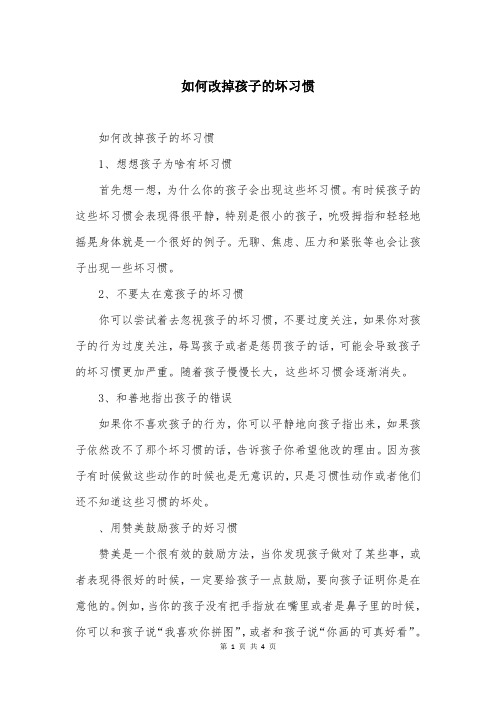
如何改掉孩子的坏习惯如何改掉孩子的坏习惯1、想想孩子为啥有坏习惯首先想一想,为什么你的孩子会出现这些坏习惯。
有时候孩子的这些坏习惯会表现得很平静,特别是很小的孩子,吮吸拇指和轻轻地摇晃身体就是一个很好的例子。
无聊、焦虑、压力和紧张等也会让孩子出现一些坏习惯。
2、不要太在意孩子的坏习惯你可以尝试着去忽视孩子的坏习惯,不要过度关注,如果你对孩子的行为过度关注,辱骂孩子或者是惩罚孩子的话,可能会导致孩子的坏习惯更加严重。
随着孩子慢慢长大,这些坏习惯会逐渐消失。
3、和善地指出孩子的错误如果你不喜欢孩子的行为,你可以平静地向孩子指出来,如果孩子依然改不了那个坏习惯的话,告诉孩子你希望他改的理由。
因为孩子有时候做这些动作的时候也是无意识的,只是习惯性动作或者他们还不知道这些习惯的坏处。
、用赞美鼓励孩子的好习惯赞美是一个很有效的鼓励方法,当你发现孩子做对了某些事,或者表现得很好的时候,一定要给孩子一点鼓励,要向孩子证明你是在意他的。
例如,当你的孩子没有把手指放在嘴里或者是鼻子里的时候,你可以和孩子说“我喜欢你拼图”,或者和孩子说“你画的可真好看”。
5、给孩子找一个代替品当你发现了孩子的坏习惯,你可以给孩子找一个其他的东西来分散孩子的注意力。
当你发现孩子在挖鼻孔的时候,给孩子一个能分散他注意力的玩具。
当你发现孩子在吸手指的时候,给他一个棒棒糖。
如果你的孩子会出现焦虑、紧张或者是有压力,你可以先让他冷静下来,和他温柔地说说话,或者是用他最喜欢的玩具分散下他的注意力。
6、给孩子制定奖励制度给孩子制定一个奖励制度来鼓励孩子的行为,当你发现孩子会自己玩玩具了,不会那么依赖别人了,给孩子奖励一个贴纸。
如果你希望你的奖励更有效的话,你要在孩子刚做完的时候就立马给他奖励,这样他的印象才会更深刻。
当孩子积累了一定的贴纸的时候,用贴纸换一个更大的玩具给他。
2孩子坏习惯的表现有哪些1、吃饭不老实也就半个多月的时间,这吃饭时也捣蛋的坏习惯就养成了。
8个小方法帮你改掉坏习惯
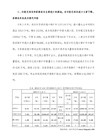
5、抵制诱惑。
哪些东西触发了你的坏习惯?你对此要有充分的了解。如,哪些场合下你会乱花钱?橱柜里有哪些根本就不需要的而且对你的健康没有多大益处的东西?有哪些人拖你下水,让你回归到过去的习惯中去?
6、用一个新习惯来替代旧习惯。
要是你停止去做一件事,那么在你的生活中自然会出现一块空白。要是你用一个新习惯来补缺这个空档,那么你自然就很难旧病复发了。要是你家里储存有薯片,糖 果之类的零食的话,就用水果和坚果取代它们。要是你不再花费晚上的数小时时间网上冲浪或查看社交媒体的话,你就可以利用这部分空出来的时间去阅读更多的书 籍,或是加入一个俱乐部,参加一项运动也可以,两个或两个以上。
一次性就修正好你的人生这个想法是很不错。只不过,一旦回归到现实生活,你就会在压力和筋疲力竭之中看到这样的美梦彻底破灭。不要去装超人或神奇女侠。从简单入手,一步一步来,你最终就会看到最后胜利的曙光。
8、不要把改变坏习惯这件事看得太过严重。
要是你老是思考着改变习惯这件事,或是老是对此唠叨个不停,你就会感觉到它好像变成了你人生中的头等大事那样重要。这只会在心理上让你遭受每日的压抑情 绪。你不该这样做,而是要意识到这样一个简单的事实:你想要改变的那个坏习惯,没什么大不了的,因为过去也有无数人和你一样都被它困扰着。
4、如果不作出改变的话,五年后,十年后情况又会怎样呢?
充分发挥你的想象力,想想自己的未来是怎样的一副画面。你会走向何方?负债累累?患有心脏病?身体很差?生活中的各种不顺心?要是你现在有机会改变这样的未来,你还会纵使自己沦落到那种地步吗?
开动脑筋想想所有那些积极的和美好的事物,它们又会给你五年后,十年后的生活带来怎样的影响呢?当你就快要放弃并又回归到过去的坏习惯中去的时候,拿出一张纸,把两种结果写下来,你想要积极的呢还是消极的?
【如何帮孩子纠正坏习惯】帮孩子纠正坏习惯的方法
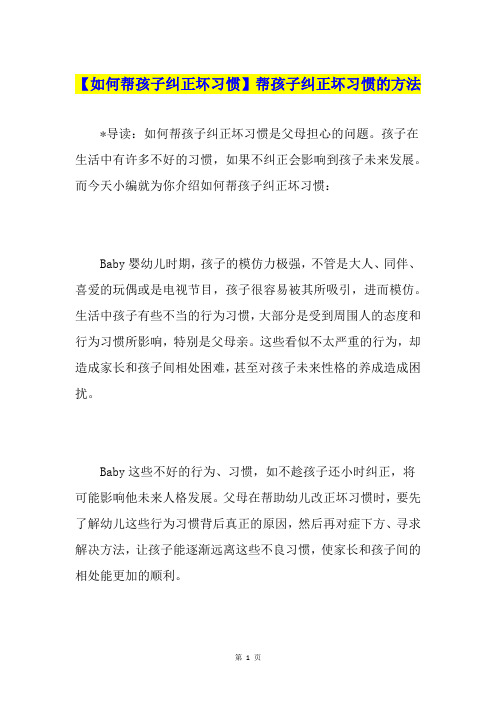
【如何帮孩子纠正坏习惯】帮孩子纠正坏习惯的方法*导读:如何帮孩子纠正坏习惯是父母担心的问题。
孩子在生活中有许多不好的习惯,如果不纠正会影响到孩子未来发展。
而今天小编就为你介绍如何帮孩子纠正坏习惯:Baby婴幼儿时期,孩子的模仿力极强,不管是大人、同伴、喜爱的玩偶或是电视节目,孩子很容易被其所吸引,进而模仿。
生活中孩子有些不当的行为习惯,大部分是受到周围人的态度和行为习惯所影响,特别是父母亲。
这些看似不太严重的行为,却造成家长和孩子间相处困难,甚至对孩子未来性格的养成造成困扰。
Baby这些不好的行为、习惯,如不趁孩子还小时纠正,将可能影响他未来人格发展。
父母在帮助幼儿改正坏习惯时,要先了解幼儿这些行为习惯背后真正的原因,然后再对症下方、寻求解决方法,让孩子能逐渐远离这些不良习惯,使家长和孩子间的相处能更加的顺利。
*由模仿养成习惯Baby常可以听到一些家长在谈论,为什么别人的宝宝都会乖乖吃饭、睡觉、收拾玩具可是我的宝宝怎么教都教不好,总是要弄到破口大骂、生气,才可以解决。
Baby成长中的幼儿,在生活中常会出现一些不好的行为和习惯是很普遍的。
根据调查发现,一般幼儿容易出现的坏习惯,除了由模仿而来外,绝大部分还是受到父母的影响,如大人睡眠时间晚、吃饭时间不固定或边吃边看电视、用完东西随手放置等。
婴幼儿时期孩子的模仿力极强,大人的一言一行容易为孩子所吸引、模仿,进而造成一些习惯的养成。
*幼儿易出现的坏习惯Baby在此列出一般幼儿容易出现的坏习惯和行为、形成原因、对幼儿人格可能产生的影响以及解决的方法,提供父母在育儿时参考。
*(1)不良的睡眠习惯种类:半夜惊醒哭泣、睡觉前和醒时哭闹不休、要大人陪才肯入睡、拒绝睡觉原因:⒈生病,如发烧、腹痛所引起的睡眠障碍。
⒉房间环境不佳,如太冷、太热或太亮导致孩子哭醒。
⒊对睡眠产生恐惧。
⒋睡前活动太激烈或吃太多东西。
⒌午睡睡太多。
⒍家长本身有晚睡习惯,也造成孩子睡眠时间不固定。
如何改掉自己身上善变的坏习惯
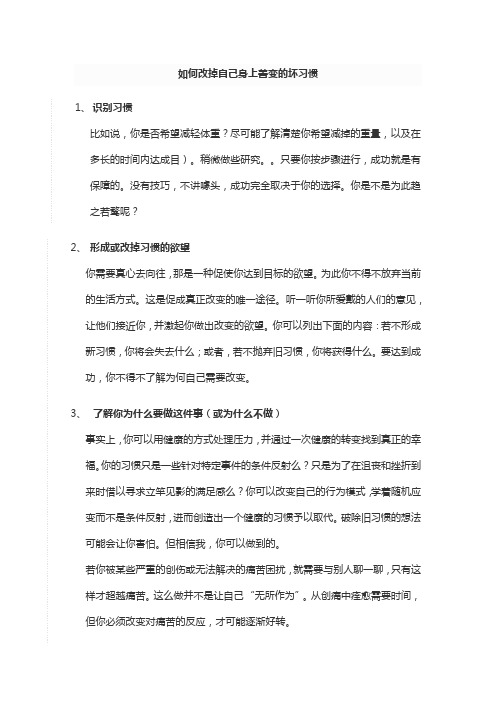
如何改掉自己身上善变的坏习惯1、识别习惯比如说,你是否希望减轻体重?尽可能了解清楚你希望减掉的重量,以及在多长的时间内达成目)。
稍微做些研究。
只要你按步骤进行,成功就是有保障的。
没有技巧,不讲噱头,成功完全取决于你的选择。
你是不是为此趋之若鹜呢?2、形成或改掉习惯的欲望你需要真心去向往,那是一种促使你达到目标的欲望。
为此你不得不放弃当前的生活方式。
这是促成真正改变的唯一途径。
听一听你所爱戴的人们的意见,让他们接近你,并激起你做出改变的欲望。
你可以列出下面的内容:若不形成新习惯,你将会失去什么;或者,若不抛弃旧习惯,你将获得什么。
要达到成功,你不得不了解为何自己需要改变。
3、了解你为什么要做这件事(或为什么不做)事实上,你可以用健康的方式处理压力,并通过一次健康的转变找到真正的幸福。
你的习惯只是一些针对特定事件的条件反射么?只是为了在沮丧和挫折到来时借以寻求立竿见影的满足感么?你可以改变自己的行为模式,学着随机应变而不是条件反射,进而创造出一个健康的习惯予以取代。
破除旧习惯的想法可能会让你害怕。
但相信我,你可以做到的。
若你被某些严重的创伤或无法解决的痛苦困扰,就需要与别人聊一聊,只有这样才超越痛苦。
这么做并不是让自己“无所作为”。
从创痛中痊愈需要时间,但你必须改变对痛苦的反应,才可能逐渐好转。
4、用正面讯息取代负面讯息一旦你放弃旧习惯或开始新习惯时,你就已经改变了。
记得提醒自己,向自己传递“我正在减肥,我正在戒烟中,我已经变成了更果断的人……”或任何与你的目标相匹配的讯息。
只要真心相信自己已经有所改变,这些讯息就会解放你的思想。
如果可以的话,把你的誓愿张贴在你可以看到的地方。
你必须铭记在心的是,对成功的坚定信念是成功的必要因素。
5、力求明确:为成功做出计划要达到成功你需要细节。
如要停止吸烟,制定一个详细的计划。
调查一下你可能会需要的非处方药品,用网络查找与戒烟相关的支持小组,或查阅相关资料。
若需减轻体重,千万不要选中一个不健康的减肥计划。
改变我们的不良习惯并彻底消除不良情绪(一)

改变我们的不良习惯并彻底消除不良情绪(一)在很多时候,我们已经知道所要的是什么,也知道如何得到方法而付诸行动。
但是就在行动的过程中,会产生许多自己设置的障碍,以至于阻挡了我们前进的步伐。
这些障碍就是在不知不觉养成的坏习惯。
比如:犹豫不决、沮丧等等。
在这一部分中,我们会学到几种方法以消除自己的坏习惯和不良的情绪。
第一种方式是转换模式。
这种方法是:让自己想出一个已经拥有但又必须改掉的坏习惯,并确定有勇气改变它。
你可以这样去做:首先闭上眼睛想象一个你想要改变的行为。
接着在脑海里想象这些画面。
想象你自己要开始犹豫不决、沮丧等等。
务必影像清晰,你想象开始进行,力求看见自己在沮丧、犹豫不决或其它画面直到清楚。
(必须是还没有发生前的)接着想象这个画面被推在一旁,并想象出一个你所想看到结果的画面。
结果的画面是一个最理想最真实的自我画面,也就是想要达到的画面,这个画面中的人就是你想要变成的人。
接下来想象第一个画面变大,想象第二个画面变小放在第一个画面之后,再将它拉的越来越远,使它越来越小。
就在最后一刻,你放开了小的画面,它却开始呼啸着飞回来,变得越来越大,最后“轰”的一声穿过原来的大画面,回到脑海里。
(要连续做并越来越快,越快越好。
)这种方式在神经语言学里面叫做弹弓方式,这样的练习,是在潜意识里面把我们的坏习惯消除,他可以消除任何的习惯,消除的坏习惯越多,就越有利于我们付诸行动。
在这里,除了弹弓方式外,你还可以掌握到另外一种方法,用于消除我们的不良情绪或感觉。
有时候,我们虽然经过努力但仍然没有取得理想的成绩,在这种情况下,自己就会产生不好的感觉,认为工作不好作、身体疲惫、心态不好。
要怎么样解决呢?首先你要先下决定,决定自己要免除沮丧的感觉,使失败和成功的恐惧再也不会影响你。
第二步是改变心理、生理并制造积极联想。
当你的心灵系统一直反射过去的失败经验的时候,在这种情况下,你是根本不能继续下去的。
你可以首先写出困扰着自己最多的坏习惯、负面情绪或是不好的感觉是什么?比如挫折感、失败等等,这里是指困扰着自己最多的坏习惯。
如何改掉孩子马虎的坏习惯-习惯养成
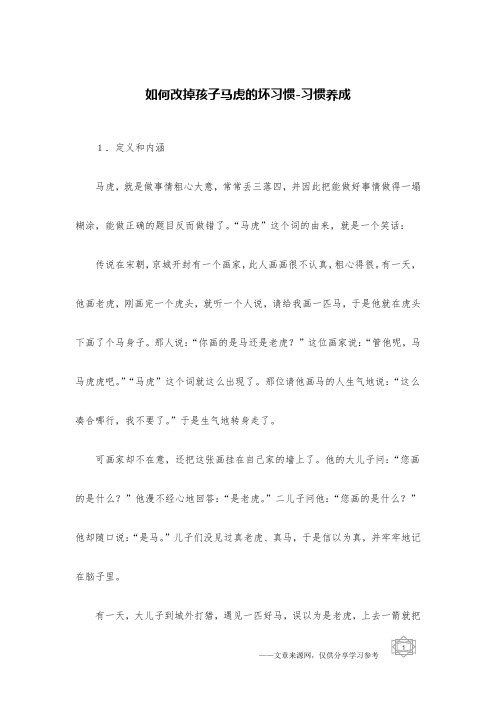
如何改掉孩子马虎的坏习惯-习惯养成1.定义和内涵马虎,就是做事情粗心大意,常常丢三落四,并因此把能做好事情做得一塌糊涂,能做正确的题目反而做错了。
“马虎”这个词的由来,就是一个笑话:传说在宋朝,京城开封有一个画家,此人画画很不认真,粗心得很。
有一天,他画老虎,刚画完一个虎头,就听一个人说,请给我画一匹马,于是他就在虎头下画了个马身子。
那人说:“你画的是马还是老虎?”这位画家说:“管他呢,马马虎虎吧。
”“马虎”这个词就这么出现了。
那位请他画马的人生气地说:“这么凑合哪行,我不要了。
”于是生气地转身走了。
可画家却不在意,还把这张画挂在自己家的墙上了。
他的大儿子问:“您画的是什么?”他漫不经心地回答:“是老虎。
”二儿子问他:“您画的是什么?”他却随口说:“是马。
”儿子们没见过真老虎、真马,于是信以为真,并牢牢地记在脑子里。
有一天,大儿子到城外打猎,遇见一匹好马,误以为是老虎,上去一箭就把它射死了,画家只好给马的主人赔偿损失。
他的二儿子在野外碰上了老虎,可却以为是马,迎过去要骑它,结果被老虎咬死了。
画家痛心极了,痛恨自己办事不认真,太马虎,生气地把那幅虎头马身子的画给烧了。
为了让后人吸取教训,他沉痛地写了一首打油诗:“马虎图,马虎图,似马又似虎。
大儿仿图射死了马,二儿仿图喂了虎。
草堂焚毁马虎图,奉劝诸君莫学吾。
”故事看似荒唐,但是其内在的道理却是深刻的。
在一些关键时候,马虎还可能造成不必要的损失。
有个孩子从小养成马虎的坏习惯,长大了当建筑师,在计算工地用料时,把砖的数量后面多写了一个“0”,结果工地的砖多运去9倍,盖完楼又用汽车往回运。
仅这一项就损失国家财产上万元。
马虎的原因是多方面的,要克服马虎的坏习惯,首先要找到马虎的原因。
一般来说,马虎有以下几个原因:第一,态度问题。
态度不认真,对学习缺乏责任心,敷衍了事,因而理解知识时囫囵吞枣,作作业时敷衍塞责,马马虎虎凑合着做完得了。
第二,性格问题。
急脾气,干什么事都心急,急急忙忙难免出错。
如何改掉坏习惯和养成良好的习惯(精选)

如何改掉坏习惯和养成良好的习惯(精选)如何改掉坏习惯和养成良好的习惯(精选)习惯是每个人行为的一部分,它们可以对我们的生活产生深远的影响。
良好的习惯可以帮助我们提高效率、减轻压力,而坏习惯则可能阻碍我们的成长和幸福。
在本文中,我将分享一些关于如何改掉坏习惯和养成良好习惯的精选方法。
一、认识自己的习惯要改掉坏习惯或养成良好的习惯,首先需要认识自己的习惯。
观察自己的行为模式,记录下自己经常做的事情以及不良习惯的具体表现。
例如,如果您经常拖延做事,可以记录自己拖延的原因和频率,以及拖延带来的负面影响。
了解自己的习惯模式有助于我们更好地理解为什么我们会陷入不良习惯,从而为制定改变计划做好准备。
二、设定明确的目标要改掉坏习惯或养成良好习惯,需要设定明确的目标。
目标应该具体、可量化,例如设定一个每天锻炼30分钟的目标,或者每天早上按时起床。
在设定目标时,要考虑现实情况和可行性。
目标过高或过于苛刻可能会让我们感到沮丧,进而放弃改变自己的习惯。
适度挑战自己是有益的,但也不要过分追求完美。
三、寻找替代行为改掉坏习惯的一个有效策略是寻找替代行为。
当我们意识到自己正在执行一个不良习惯时,可以尝试寻找一个替代行为来代替它。
例如,如果您习惯性地吃零食来应对压力,可以尝试替代行为,如喝一杯茶或进行深呼吸来缓解压力。
替代行为可以帮助我们打破坏习惯的循环和联结,从而逐渐改变我们的行为模式。
四、建立正面的奖励系统奖励是改变习惯的强大驱动力之一。
建立一个正面的奖励系统是培养良好习惯的一种有效方法。
当我们成功地改掉坏习惯或坚持良好习惯时,给自己一个小奖励,例如购买一件心仪的物品或者享受一顿美食。
奖励不仅可以让我们获得满足感和成就感,还可以增强我们对良好习惯的信心和动力,使我们更加积极地坚持习惯的改变。
五、逐渐改变习惯改变习惯是一个渐进的过程,不应该期待立竿见影的结果。
应该逐渐引入新的习惯,并坚持一段时间,直至它们成为我们的自然反应。
如何改掉自身的坏习惯

如何改掉自身的坏习惯改掉自身的坏习惯是一项艰巨的任务,但是一旦养成了良好的习惯,它将对我们的健康、幸福和成功产生积极的影响。
在本文中,我将提供一些方法和建议,帮助你改掉自身的坏习惯。
首先,认识到自己的坏习惯是改变的第一步。
要认真思考自己的行为和习惯,并反思它们对自己和他人的影响。
明确意识到坏习惯给你带来了负面的结果,并且有决心改变。
然后,制定一个明确的目标。
确定你希望达到的结果,并设定一个明确的时间表。
确保目标具体、可衡量和可实现,并将其记录下来,以便将来能够回顾和追溯。
接下来,分析坏习惯的原因。
探索为什么你会有这个坏习惯,它是如何形成的,并了解背后的触发因素。
这有助于你找到改变的策略和方法。
一种常用的方法是替代式行为。
找到一个积极、健康且能替代坏习惯的行为,并将其作为新的习惯来养成。
例如,如果你有吃零食的坏习惯,你可以尝试饮用水或咀嚼口香糖作为替代。
每当你想要执行坏习惯时,尝试将注意力转移到这个替代行为上。
此外,建立一个支持系统是非常重要的。
找到一些志同道合的朋友或家人,告诉他们你想要改变的坏习惯,并寻求他们的支持和鼓励。
不仅如此,也可以加入一些支持群体或社区,与他们分享你的经历和进展,并从他们那里获得建议和支持。
妥善处理诱惑是改变坏习惯的关键。
意识到不可抵挡的冲动并不是坏习惯能够就此破灭的理由。
相反,尝试使用各种方法来缓解和应对诱惑。
例如,你可以试着转移注意力,做一些其他活动来摆脱诱惑;或者你可以试着找到一个理智的方式来应对它,例如给自己设定一些规则和限制。
此外,坚持是改变的关键。
坏习惯是在长期形成的过程中建立起来的,因此改变它们也需要时间和耐心。
要坚持自己的目标和计划,并做好长期的心理准备。
当你遇到困难和挫折时,不要灰心丧气,而要保持积极的心态,并继续努力。
最后,及时回顾和检查自己的进度是必不可少的。
定期回顾自己的计划和目标,评估自己的进展,并及时进行调整和改进。
如果你在实现目标方面遇到困难或挫折,不要害怕寻求帮助并重新制定计划,以确保取得成功。
孩子总是丢三落四怎么办如何改掉
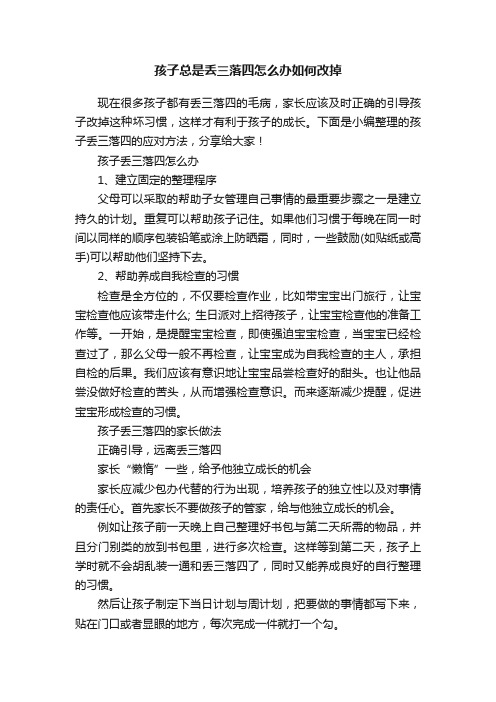
孩子总是丢三落四怎么办如何改掉现在很多孩子都有丢三落四的毛病,家长应该及时正确的引导孩子改掉这种坏习惯,这样才有利于孩子的成长。
下面是小编整理的孩子丢三落四的应对方法,分享给大家!孩子丢三落四怎么办1、建立固定的整理程序父母可以采取的帮助子女管理自己事情的最重要步骤之一是建立持久的计划。
重复可以帮助孩子记住。
如果他们习惯于每晚在同一时间以同样的顺序包装铅笔或涂上防晒霜,同时,一些鼓励(如贴纸或高手)可以帮助他们坚持下去。
2、帮助养成自我检查的习惯检查是全方位的,不仅要检查作业,比如带宝宝出门旅行,让宝宝检查他应该带走什么; 生日派对上招待孩子,让宝宝检查他的准备工作等。
一开始,是提醒宝宝检查,即使强迫宝宝检查,当宝宝已经检查过了,那么父母一般不再检查,让宝宝成为自我检查的主人,承担自检的后果。
我们应该有意识地让宝宝品尝检查好的甜头。
也让他品尝没做好检查的苦头,从而增强检查意识。
而来逐渐减少提醒,促进宝宝形成检查的习惯。
孩子丢三落四的家长做法正确引导,远离丢三落四家长“懒惰”一些,给予他独立成长的机会家长应减少包办代替的行为出现,培养孩子的独立性以及对事情的责任心。
首先家长不要做孩子的管家,给与他独立成长的机会。
例如让孩子前一天晚上自己整理好书包与第二天所需的物品,并且分门别类的放到书包里,进行多次检查。
这样等到第二天,孩子上学时就不会胡乱装一通和丢三落四了,同时又能养成良好的自行整理的习惯。
然后让孩子制定下当日计划与周计划,把要做的事情都写下来,贴在门口或者显眼的地方,每次完成一件就打一个勾。
慢慢的从小事做起,一点一点的引导他去独立的完成事情,让他知道家长不会帮他,这样他就能改掉丢三落四的坏习惯了。
让孩子尝到丢三落四的苦果只有让孩子尝到教训后才会长记性,知道了自己的丢三落四会造成怎样的后果,那么今后才会有所收敛。
比如出门前提醒孩子检查下书包,看是否有遗漏的东西。
只提醒一遍,不要多说。
如果孩子出门后发现忘带了东西,应告诉孩子自己去拿。
六种方法纠正孩子坏习惯
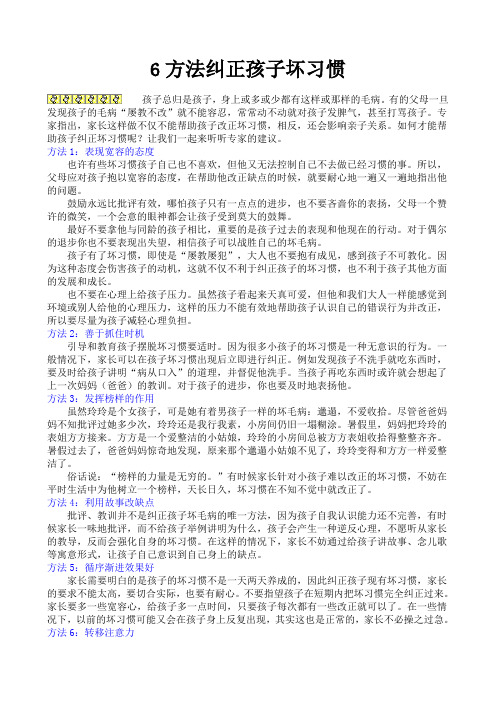
6方法纠正孩子坏习惯孩子总归是孩子,身上或多或少都有这样或那样的毛病。
有的父母一旦发现孩子的毛病“屡教不改”就不能容忍,常常动不动就对孩子发脾气,甚至打骂孩子。
专家指出,家长这样做不仅不能帮助孩子改正坏习惯,相反,还会影响亲子关系。
如何才能帮助孩子纠正坏习惯呢?让我们一起来听听专家的建议。
方法1:表现宽容的态度也许有些坏习惯孩子自己也不喜欢,但他又无法控制自己不去做已经习惯的事。
所以,父母应对孩子抱以宽容的态度,在帮助他改正缺点的时候,就要耐心地一遍又一遍地指出他的问题。
鼓励永远比批评有效,哪怕孩子只有一点点的进步,也不要吝啬你的表扬,父母一个赞许的微笑,一个会意的眼神都会让孩子受到莫大的鼓舞。
最好不要拿他与同龄的孩子相比,重要的是孩子过去的表现和他现在的行动。
对于偶尔的退步你也不要表现出失望,相信孩子可以战胜自己的坏毛病。
孩子有了坏习惯,即使是“屡教屡犯”,大人也不要抱有成见,感到孩子不可教化。
因为这种态度会伤害孩子的动机,这就不仅不利于纠正孩子的坏习惯,也不利于孩子其他方面的发展和成长。
也不要在心理上给孩子压力。
虽然孩子看起来天真可爱,但他和我们大人一样能感觉到环境或别人给他的心理压力,这样的压力不能有效地帮助孩子认识自己的错误行为并改正,所以要尽量为孩子减轻心理负担。
方法2:善于抓住时机引导和教育孩子摆脱坏习惯要适时。
因为很多小孩子的坏习惯是一种无意识的行为。
一般情况下,家长可以在孩子坏习惯出现后立即进行纠正。
例如发现孩子不洗手就吃东西时,要及时给孩子讲明“病从口入”的道理,并督促他洗手。
当孩子再吃东西时或许就会想起了上一次妈妈(爸爸)的教训。
对于孩子的进步,你也要及时地表扬他。
方法3:发挥榜样的作用虽然玲玲是个女孩子,可是她有着男孩子一样的坏毛病:邋遢,不爱收拾。
尽管爸爸妈妈不知批评过她多少次,玲玲还是我行我素,小房间仍旧一塌糊涂。
暑假里,妈妈把玲玲的表姐方方接来。
方方是一个爱整洁的小姑娘,玲玲的小房间总被方方表姐收拾得整整齐齐。
如何改变坏习惯?

如何改变坏习惯?每个人都有自己的习惯,有些习惯是好的,有助于我们的生活和工作;而有些习惯则是坏的,可能会对我们的身体和心理健康产生负面影响。
那么,如何才能改变这些坏习惯呢?本文将为您提供一些建议。
1. 认识到问题要想改变一个坏习惯,首先需要认识到这个习惯是有害的。
您可以回顾一下自己的过去,找出那些导致不良后果的习惯,并意识到需要改变。
同时,您还可以请教身边的亲朋好友,听取他们的意见和看法,以便更客观地看待自己的问题。
2. 设定目标明确自己想要达到的目标是改变坏习惯的关键。
您可以根据自己的实际情况,设定一个切实可行的目标。
例如,如果您想要改掉熬夜的习惯,可以先从每天提前半小时睡觉开始;如果您想要减少吸烟量,可以先尝试逐渐减少每天的吸烟次数。
3. 制定计划有了目标之后,您需要制定一个详细的计划来实现它。
计划应该包括具体的行动步骤、时间安排以及可能遇到的困难和应对方法。
例如,如果您想要改掉晚睡的习惯,可以计划在晚上10点之前上床休息;如果您想要戒烟,可以制定一个逐步减少吸烟量的计划,并寻找替代品来应对烟瘾。
4. 培养新习惯要改变坏习惯,需要培养一个新的、有益的习惯来取代它。
这个新习惯应该与您想要改变的习惯相反,且更容易坚持下去。
例如,如果您想要改掉晚睡的习惯,可以尝试在晚上进行一些轻松的活动,如阅读、听音乐等,以帮助自己放松心情,更容易入睡;如果您想戒烟,可以尝试进行适量的运动,以提高身体素质,减轻戒烟过程中的不适感。
5. 坚持不懈改变习惯是一个长期的过程,需要您的持续努力和毅力。
在这个过程中,您可能会遇到一些挫折和困难,但请不要轻易放弃。
您可以从自己的进步中找到信心和动力,相信自己一定能够成功地改变坏习惯。
6. 寻求支持改变坏习惯的过程中,寻求家人、朋友和专业人士的支持是非常重要的。
他们可以帮助您度过难关,提供鼓励和建议。
此外,您还可以加入一些互助小组或社区团体,与其他人一起分享经验和心得,共同成长。
如何改掉坏习惯
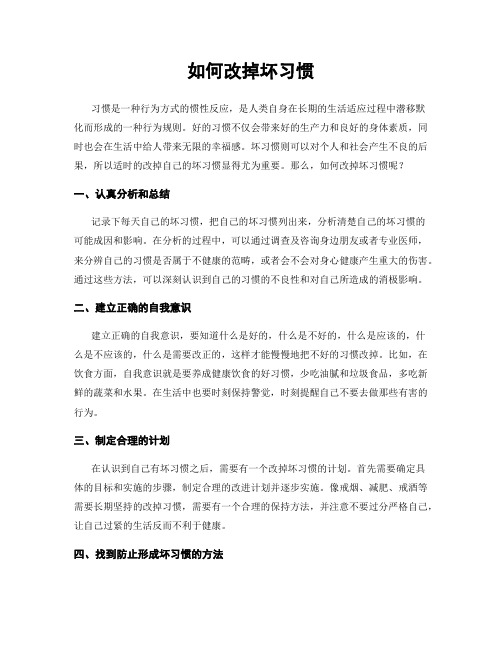
如何改掉坏习惯习惯是一种行为方式的惯性反应,是人类自身在长期的生活适应过程中潜移默化而形成的一种行为规则。
好的习惯不仅会带来好的生产力和良好的身体素质,同时也会在生活中给人带来无限的幸福感。
坏习惯则可以对个人和社会产生不良的后果,所以适时的改掉自己的坏习惯显得尤为重要。
那么,如何改掉坏习惯呢?一、认真分析和总结记录下每天自己的坏习惯,把自己的坏习惯列出来,分析清楚自己的坏习惯的可能成因和影响。
在分析的过程中,可以通过调查及咨询身边朋友或者专业医师,来分辨自己的习惯是否属于不健康的范畴,或者会不会对身心健康产生重大的伤害。
通过这些方法,可以深刻认识到自己的习惯的不良性和对自己所造成的消极影响。
二、建立正确的自我意识建立正确的自我意识,要知道什么是好的,什么是不好的,什么是应该的,什么是不应该的,什么是需要改正的,这样才能慢慢地把不好的习惯改掉。
比如,在饮食方面,自我意识就是要养成健康饮食的好习惯,少吃油腻和垃圾食品,多吃新鲜的蔬菜和水果。
在生活中也要时刻保持警觉,时刻提醒自己不要去做那些有害的行为。
三、制定合理的计划在认识到自己有坏习惯之后,需要有一个改掉坏习惯的计划。
首先需要确定具体的目标和实施的步骤,制定合理的改进计划并逐步实施。
像戒烟、减肥、戒酒等需要长期坚持的改掉习惯,需要有一个合理的保持方法,并注意不要过分严格自己,让自己过紧的生活反而不利于健康。
四、找到防止形成坏习惯的方法改掉坏习惯除了找到根源,还需要找到防止形成坏习惯的方法。
例如,喜欢熬夜的人可以尝试做到早睡早起,坚持规律的作息时间;经常摸手机的人可以尝试集中精力处理事情,避免分散注意力。
五、找到适合的替代方式为了改掉坏习惯,需要找到适合的替代方式。
比如,如果因为工作繁忙而导致饮食不健康,可以尝试自己做饭,并食用新鲜健康的食品。
还有人会习惯手欠摸到脸,这个时候可以靠自制小玩具,用来转移注意力。
通过找到适合的替代方式,可以逐渐的加强巩固新习惯,促进自己更好地适应新的生活方式。
如何改掉坏习惯(克服陋习) Get Rid of Bad Habits

如何改掉坏习惯(克服陋习) Get Rid of Bad Habits如何改掉坏习惯范文1:We all have certain kinds of bad habits. For teenagers, it is very important to get rid of bad habits.Let"s take the habits of talking in class as an example. If we talk in class, we can"t listen to the teachers carefully. Of course we can"t understand the teachers, and can"t finish our homework easily after class. Some students have to copy others" homework when the teachers ask us to hand it in. Then we will get weak in our school lessons and we will become a bad student in the teachers" eyes. Besides, talking in class maybe influences some other students.So, we must get rid of bad habits at once.我们都有各种各样的坏习惯。
对于青少年来说,改掉这些坏习惯是非常重要的。
让我们以上课说话为例。
如果我们上课说话,我们就不能注意听讲,当然不能很好的理解老师所讲的内容,课后就不能轻易完成老师的作业。
当老师要求我们交作业时,一些同学不得不去抄袭其他同学的作业。
然后我们的功课会变得很差,我们将会变成一个老师眼中的坏学生。
什么是习惯,如何改变坏习惯

什么是习惯,如何改变坏习惯习惯及其伴随而来的能量趋势,造就了我们的生活。
从早到晚,每个人都养成了一套自己例行的习惯,而其中大多数,我们会毫不多想就去做了。
每逢新年我们总会决心改掉某些习惯,然而每年也面临许多挫败。
人人都知道,想增进身体健康就必须彻底革新生活方式,包括饮食、运动、睡眠、呼吸、情绪和思考方式。
但究竟什么是习惯?习惯真的能改变吗?其实改变习惯比想像中更容易。
在谈改变习惯之前,在此先厘清一些观念。
并非所有习惯都不好每个人都有不只一、两个,而是成千上万个习惯!我们所做的每件事都是某种习惯的呈现,生活原本就是多种习惯的表相。
根据美国心理学之父威廉.詹姆斯(Prof. William James)的定义,“习惯只是大脑释放电波时,创建的一条新路径,尔后发生的刺激便很容易地循此路径。
”《世纪大辞典(Century Dictionary)》对习惯的定义则是,“一种自然、不随意、本能而不自觉的行为模式。
”心理学家高迪(Gordy)认为习惯是:“在类似情境下,我们身心的任何动作,每一次都比过去更能轻易地表现出来。
”习惯会将所有动作减化至最简单的状态,因此可以节省能量;习惯能使动作正确且精准,因此能帮助培养技能;习惯能帮助建立所有动作的进行顺序,使动作简单化,避免疲劳。
简而言之,习惯就是一种我们一再重复的行动,一种常被运用的行为!那什么是坏习惯?坏习惯就是在当下对我们不利的习惯。
许多坏习惯是不知不觉中再三重复所养成的小动作,从皮笑肉不笑、想吃垃圾食物,乃至抖动、讥笑、不良的姿势等等肌肉与神经上的习性,都是从小不断累积的举动,只是现在不再对我们有益,所以必须去除罢了。
一旦了解,就可以立即消除我们心中因坏习惯而来的罪恶感。
所谓的坏习惯,只是过去养成的无害习惯,当时自有其存在的理由,但对现在已了无帮助。
因为如此,我们根本不需要将坏习惯视为必须不惜一切代价毁除的污点,也不应该让自己与之奋战不休,到头来还是除不掉。
改掉坏习惯

改掉坏习惯改掉坏习惯:坚持自我控制,迈向成功人生习惯是一种习得性行为模式,是我们在日常生活中形成的自然反复的行动模式,是我们更深层次的行为方式和思考方式。
习惯有好坏之分,而当人们养成了坏习惯时,这种习惯往往会成为影响到人们一生的因素,会影响一个人的自我形象、心理状态以及人际交往关系。
因此,改掉坏习惯是一项重要的任务。
本文将通过分析坏习惯的危害、改掉坏习惯的方法以及成功的例子,来帮助读者更好地理解和掌握改掉坏习惯的方法和道理。
一、坏习惯的危害坏习惯对人们的身心健康、个人形象、职业生涯都带来了很大的负面影响,具体如下:1. 身体健康受损:含糖饮料、烟草、酒精等不良习惯会给身体带来很大的伤害,导致肥胖、癌症、糖尿病等常见疾病,严重损害身体健康。
2. 个人形象下降:指甲咬、乱脱头发、咳嗽等不良习惯会让人感到衣着不整、毫不修饰。
懒散的个人形象会降低我们的自信心和自我形象,进而影响我们的交际能力。
3. 职业生涯受损:习惯性迟到、荒废时间、偷懒等不良习惯在职场上很难获得成长和升职的机会。
相信公司不想因为一个员工的习惯对团队形象造成不良影响。
二、改掉坏习惯的方法1. 寻找替代行为改掉坏习惯的首要条件是意识到自己的坏习惯并且愿意改掉它。
这时候,我们就可以开始寻找可以替代这些坏习惯的行为。
例如,我们可以用时间管理的方法来替代拖延的行为。
通过这些改变,我们可以养成长期的积极行为模式,以便使身体、心灵和职业生涯更健康。
2. 为自己设立目标明确自己的目标对改掉坏习惯是非常重要的。
修改自己的习惯、增加新的习惯需要一定的规划和目标设定。
例如,如果你希望进行运动,让你的身体更健康,那么就要具体制定相应的计划来实现这个目标。
3. 赋予自己奖励与设定目标一样,为成功养成新习惯设定奖励是很有必要的。
比如,你想通过每天读一本好书来提高自己的知识水平,那么你就可以设定一个奖励自己的规则:完成一本书后,你可以买一个你一直想要的物品,这样你就会更积极地去完成你的目标。
- 1、下载文档前请自行甄别文档内容的完整性,平台不提供额外的编辑、内容补充、找答案等附加服务。
- 2、"仅部分预览"的文档,不可在线预览部分如存在完整性等问题,可反馈申请退款(可完整预览的文档不适用该条件!)。
- 3、如文档侵犯您的权益,请联系客服反馈,我们会尽快为您处理(人工客服工作时间:9:00-18:30)。
一个简单的方式改掉坏习惯0:11When I was first learning to meditate(思考,计划), the instruction was to simply pay attention to my breath, and when my mind wandered, to bring it back.0:19Sounded simple enough. Yet I'd sit on these silent retreats(撤退、放弃), sweating(出汗、大汗淋漓)through T-shirts in the middle of winter. I'd take naps (小睡)every chance I got because it was really hard work. Actually, it was instruction was simple enough but I was missing something really important.0:39So why is it so hard to pay attention? Well, studies show that even when we're really trying to pay attention to something -- like maybe this talk -- at some point, about half of us will drift off(渐渐离去、迷糊睡去)into a daydream, or have this urge to check our Twitter feed.0:55So what's going on here? It turns out that we're fighting one of the mostevolutionarily-conserved learning processes currently known in science, one that'sconserved back to the most basic nervous systems known to man.1:08This reward-based learning process is called positive and negative reinforcement, and basically goes like this. We see some food that looks good, our brain says, "Calories! ... Survival!" We eat the food, we taste it -- it tastes good. And especially with sugar, our bodies send a signal to our brain that says,"Remember what you're eating and where you found it." We lay down this context-dependent memory and learn to repeat the process next time. See food, eat food, feel good, repeat. Trigger(触发器), behavior, reward.1:42Simple, right? Well, after a while, our creative brains say, "You know what? You can use this for more than just remembering where food is. You know, next time you feel bad, why don't you try eating something good so you'll feel better?" We thank our brains for the great idea, try this and quickly learn that if we eat chocolate or ice cream when we're mad or sad, we feel better.2:07Same process, just a different trigger. Instead of this hunger signal coming from our stomach, this emotional signal -- feeling sad -- triggers that urge to eat.2:18Maybe in our teenage years, we were a nerd(书呆子)at school, and we see those rebel kids outside smoking and we think, "Hey, I want to be cool." So we start smoking. The Marlboro Manwasn't a dork(笨蛋), and that was no accident. See cool, smoke to be cool, feel good. Repeat. Trigger, behavior, reward. And each time we do this, we learn to repeat the process and it becomes a habit. So later, feeling stressed out triggers that urge to smoke a cigarette or to eat something sweet.2:52Now, with these same brain processes, we've gone from learning to survive to literally(照字面的;不夸张的;正确的)killing ourselves with these habits. Obesity(肥胖)and smoking are among the leading preventable causes of morbidity and mortality(发病率和死亡率)in the world.3:06So back to my breath. What if instead of fighting our brains, or trying to force ourselves to pay attention, we instead tapped into this natural, reward-based learning process ... but added a twist? What if instead we just got really curious about what was happening in our momentary(瞬间的,短暂的)experience?3:24I'll give you an example. In my lab, we studied whether mindfulness training could help people quit smoking. Now, just like trying to force myself to pay attention to my breath, they could try to force themselves to quit smoking. And the majority of them had tried this before and failed -- on average, six times.3:42Now, with mindfulness training, we dropped the bit about forcing and instead focused on being curious. In fact, we even told them to smoke. What? Yeah, we said, "Go ahead and smoke, just be really curious about what it's like when you do."3:57And what did they notice? Well here's an example from one of our smokers. She said, "Mindful smoking: smells like stinky(发臭的;全景雷达)cheese and tastes like chemicals, YUCK!" Now, she knew, cognitively(认知的)that smoking was bad for her, that's why she joined our program. What she discovered just by being curiously aware when she smoked was that smoking tastes like shit.4:22(Laughter)4:25Now, she moved from knowledge to wisdom. She moved from knowing in her head that smoking was bad for her to knowing it in her bones, and the spell of smoking was broken. She started to become disenchanted(使不再着迷)with her behavior.4:41Now, the prefrontal cortex, that youngest part of our brain from an evolutionary perspective, it understands on an intellectual level that we shouldn't smoke. And it tries it's hardest to help us change our behavior, to help us stop smoking, to help us stop eating that second, that third, that fourth cookie. We call this cognitive control. We're using cognition to control ourbehavior. Unfortunately, this is also the first part of our brain that goes offline when we get stressed out, which isn't that helpful.5:13Now, we can all relate to this in our own experience. We're much more likely to do things like yell at our spouse(配偶)or kids when we're stressed out or tired, even though we know it's not going to be helpful. We just can't help ourselves.5:26When the prefrontal cortex goes offline, we fall back into our old habits, which is why this disenchantment(清醒、警觉)is so important. Seeing what we get from our habits helps us understand them at a deeper level -- to know it in our bones so we don't have to force ourselves to hold back(退缩、隐瞒、阻止) or restrain ourselves from behavior. We're just less interested in doing it in the first place.5:45And this is what mindfulness is all about: Seeing really clearly what we get when we get caught up in our behaviors, becoming disenchanted on a visceral level(本能层) and from this disenchanted stance(立场), naturally letting go.5:59This isn't to say that, poof, magically we quit smoking. But over time, as we learn to see more and more clearly the results of our actions, we let go of old habits and form new ones.6:11The paradox here is that mindfulness is just about being really interested in getting close and personal with what's actually happening in our bodies and minds from moment to moment. This willingness to turn toward our experience rather than trying to make unpleasant cravings(渴望)go away as quickly as possible. And this willingness to turn toward our experience is supported by curiosity, which is naturally rewarding.6:34What does curiosity feel like? It feels good. And what happens when we get curious? We start to notice that cravings are simply made up of body sensation s (感觉)-- oh, there's tightness, there's tension, there's restlessness(坐立不安的)-- and that these body sensations come and go. These are bite-size pieces of experiences that we can manage from moment tomoment rather than getting clobbered by this huge, scary craving that we choke on.7:01In other words, when we get curious, we step out of our old, fear-based, reactive habit patterns, and we step into being. We become this inner scientist where we're eagerly awaiting that next data point.7:17Now, this might sound too simplistic(过分简单的)to affect behavior. But in one study, we found that mindfulness training was twice as good as gold standard therapy(标准疗法)at helping people quit smoking. So it actually works.7:30And when we studied the brains of experienced meditator s(沉思者), we found that parts of a neural network(神经网络)of self-referential(自我暗示的)processing called the default mode network were at play. Now, one current hypothesis(假设)is that a region of this network, called the posterior cingulate cortex, is activated not necessarily by craving itself but when we get caught up in it, when we get sucked in, and it takes us for a ride.7:52In contrast, when we let go -- step out of the process just by being curiously aware of what's happening -- this same brain region quiets down.8:02Now we're testing app and online-based mindfulness training programs that target these core mechanisms and, ironically(讽刺的、说反话的), use the same technology that's driving us to distraction to help us step out of our unhealthy habit patterns of smoking, of stress eating and other addictive(成瘾的)behaviors.8:20Now, remember that bit about context-dependent memory? We can deliver these tools to peoples' fingertips in the contexts that matter most. So we can help them tap into their inherent (固有的)capacity to be curiously aware right when that urge to smoke or stress eat or whatever arises.8:37So if you don't smoke or stress eat, maybe the next time you feel this urge to check your email when you're bored, or you're trying to distract yourself from work, or maybe to compulsively (强迫的)respond to that text message when you're driving, see if you can tap into this natural capacity, just be curiously aware of what's happening in your body and mind in that moment. It will just be another chance to perpetuate(使长存)one of our endless and exhaustive habit loops ... or step out of it.9:05Instead of see text message, compulsively text back, feel a little bit better -- notice the urge, get curious, feel the joy of letting go and repeat.9:16 Thank you. 9:17 (Applause)。
